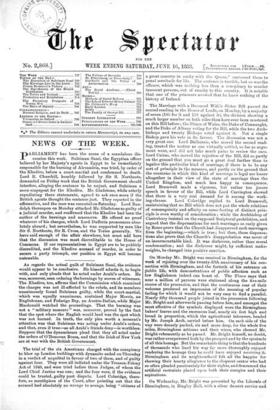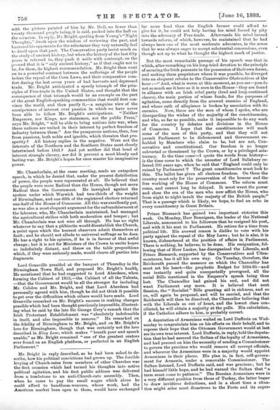On Wednesday, Mr. Bright was presented by the Liberals of
Birmingham, in Bingley Hall, with a silver dessert service and with the picture painted of him by Mr. loll, no fewer than twenty thousand people being, it is said, packed into the hall on the occasion. In reply, Mr. Bright, quoting from Young's "Night Thoughts," dwelt upon the wisdom of reviewing the past, and bantered his opponents for the reluctance they very naturally feel to dwell upon that past. The Conservative party insist much on the study of ancient history, but when the history of the last fifty years is referred to, they push it aside with contempt, on the ground that it is " only ancient history," as if that ought not to be, for them, its highest recommendation. Mr. Bright then went on to a powerful contrast between the sufferings of the people before the repeal of the Corn Laws, and their comparative com- fort during the last seven years of bad harvests and depressed trade. Mr. Bright anticipated a speedy triumph of the prin- ciples of Free-trade in the United States, and thought that the consequence of that triumph would be an example on the part of the great English-speaking communities that would first con- vince the world, and then pacify it,—a sanguine view of the omnipotence of interest over passion in which we have never been able to follow Mr. Bright's anticipations. "Neither Emperors, nor Kings, nor statesmen, nor the public Press," says Mr. Bright, " will be able to bring nations into war, when these nations are united in their interest by perfect freedom of industry between them." Are the prosperous nations, then, free from passions, both noble and ignoble, which threaten that pro- sperity ? All history replies in the negative. Were not the interests of the Northern and the Southern States most closely intertwined before 1861 ? And yet neither did that bond of interest strangle slavery, nor did it prevent a most bloody and lasting war. Mr. Bright's hopes for once master his imaginative power.



































 Previous page
Previous page